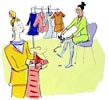
 he next time you feel that urge to shop, control it! You might just be suffering from a shopping disorder that could ruin your health, shatter your relationships and/or land you in debt.
he next time you feel that urge to shop, control it! You might just be suffering from a shopping disorder that could ruin your health, shatter your relationships and/or land you in debt.
For people are increasingly falling prey to Compulsive Shopping Disorder, a pre-occupation with shopping for unneeded items and an inability to resist buying such products.
An estimated eight per cent people in the United States are affected by this disorder. Most of them are women, some of whom have rooms full of unused purchases -- with the price tags still on.
People suffering from Compulsive Shopping Disorder experience a feeling of elation when they shop but feel guilty when they return home and scrutinise their big bags of unwanted/unnecessary items.
In India, though CSD is not as widespread, it is clearly on the rise, say psychologists.
"CSD could happen to anyone, but is found especially among those suffering from frequent spells of depression," says Dr Aroona Broota, a well-known psychologist in Delhi.
 |
Are you a shopaholic? |
 |
Stop before you shop! |
"It happens because it [this kind of shopping] diverts the mind, gives people a sense of power, helps develop an interest in the outer world and gives them a feeling of personal worth which they may otherwise not have," she says.
CSD is not an addiction or an obsession. It is part of a group of disorders called Impulse Control Disorders. These include Kleptomania (the impulse to steal) and Pyromania (the impulse to burn things).
"People suffering from these kinds of disorders are not able to control their emotions," says Samir Parikh, consultant psychiatrist at the Max Healthcare Centre, New Delhi.
"These kind of shopping sprees are more than just about money as they may land a person into debt or even ruin relationships. The biggest impact is financial debt. A person with this disorder may need to lie or steal to get money or he might hide purchases leading to a break-up of relationships," he says.
"People with Compulsive Shopping Disorder actually feel aroused or anxious to go shopping. The problem is that they feel relaxed while shopping but feel remorse afterwards," Parikh adds.
CSD is a manifestation of a larger disease, Broota says.
"This disorder is also common in people who suffer from a mania, commonly described as being on a high. People with manias act in extremes -- they love more and hate more," she explains.
Parikh says the number of cases of people suffering from CSD is less in India because it is not a very common disorder. Also, it is not a very defined disorder; cases of specific diagnosis are not common.
Though most people say they shop to escape their depression, Broota does not see this as a healthy trend.
"It is not a positive, constructive way of finding self-empowerment," she says. "Compulsive buyers are adults who haven't grown up -- persons who are looking at short-term goals, not long term benefits."
On the other hand, "shopping in moderate amounts can actually act as a therapeutic activity to cope with life's tensions," says Dr Jitendra Nagpal, psychiatrist at the Vidyasagar Institute of Mental Health and Neurosciences, New Delhi.
"Shopping often acts as a catharsis or a mood-lifting phenomenon. Buying items especially like jewellery, crystal glasses, confectionary, soft toys and books help in mood stabilisation," he says.
But if the tendency to shop is an impulse control problem developed to cope with personal problems, depression, etc, the person suffering from it may require professional help.
More women than men tend to fall prey to this disorder.
"Women go through a vacuum in relationships and may not always experience fulfilment in intimate relationships. Shopping helps them in asserting themselves and taking charge. Just stepping outside the house gives them a sense of worthiness and happiness," Nagpal explains.
Broota says the impulse to go on a shopping binge can be controlled. "You need to understand the source, where the impulse to shop is coming from and subsequently how to modify [this] behaviour. Some people need psychological help whereas if it is mania-related, the person needs medication," she says.
Unlike Parikh, Broota believes India has a large group of compulsive buyers. "These are the people credit card companies thrive on," she says.
However, most visitors to the gleaming shopping malls which have sprouted almost everywhere in the metros and even in smaller towns are only interested in window-shopping, she says. "These are usually people with big eyes, not big bags."
Parikh feels the opening of such malls is not responsible for the increasing occurrences of CSD as the disorder existed earlier as well.
Nagpal, however, says the inviting atmosphere in malls can be a pleasurable experience because the glittering environment can act as a mood-uplifting experience.
Broota feels the number of people suffering from CSD will only increase in the future as our society is becoming more materialistic and moving towards Western values.
"We have less time for relationships and a stronger sense of dissatisfaction," she says.
Image: Uday Kuckian








